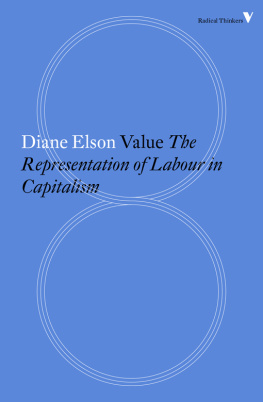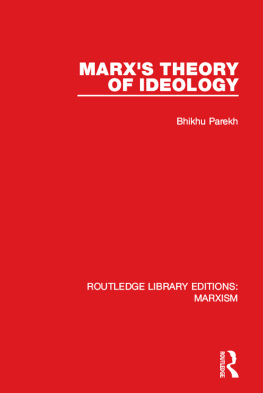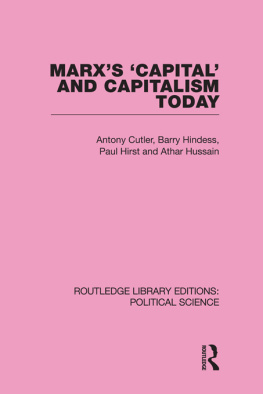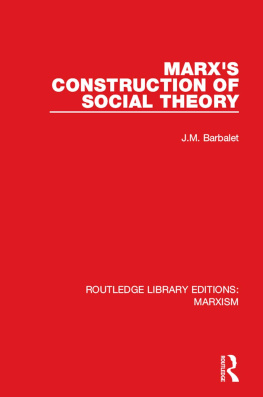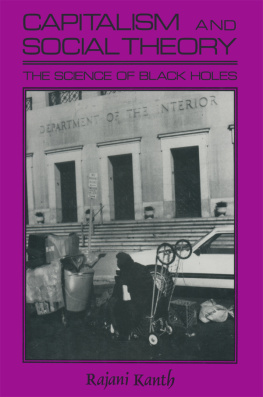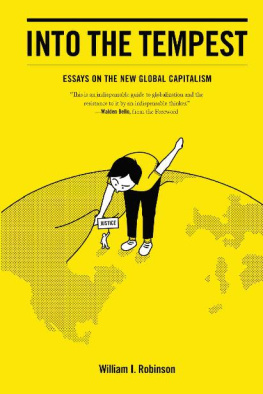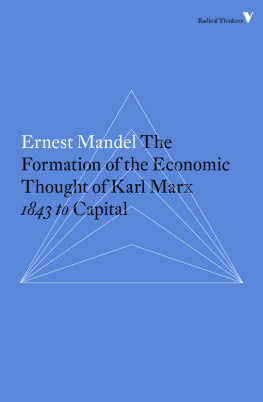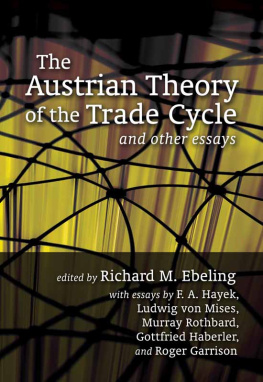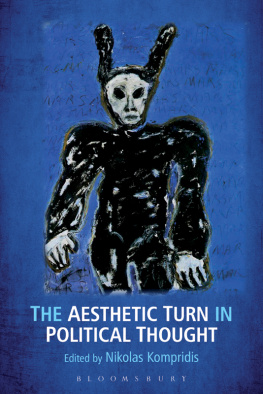Aboo Aumeeruddy is currently working at the Institute of Development Studies, Sussex University. He is a member of the Editorial Committee of Capital and Class.
Diane Elson teaches economics at the University of Manchester. She was formerly a member of the Editorial Committee of Capital and Class and of the Brighton Labour Process Group.
Athar Hussain teaches economics at the University of Keele and is a member of the CSE Money Group. He has contributed to the CSE Bulletin and Economy and Society.
Geoff Kay teaches economics at the City University, London, and is a member of the Editorial Board of Critique. He has contributed to the CSE Bulletin.
Ramon Tortajada works in the University of Grenoble, France, and has contributed to Capital and Class.
Nobuharu Yokokawa is carrying out research on the work of Ricardo and Marx at the Universities of Tokyo and Cambridge.
To some readers, the publication by CSE Books of a collection of essays on Marxs theory of value will simply be an indication of the unwillingness (or inability) of Marxist intellectuals to leave the realms of high theory and produce some politically useful, concrete analysis of the accumulation of capital today. To others it will signify a mystifying refusal to jettison a theory which, it is claimed, has now been shown to be at best redundant, at worst incoherent and without foundations in real social relations. Yet others may expect one more, incomprehensible round in a debate which obsesses Marxist economists but has little significance for those interested in Marxs theory of class or the state or the mode of production. So why has CSE Books chosen to put together this volume? Why is Marxs theory of value important?
It is important because Marxs theory of value is the foundation of his attempt to understand capitalism in a way that is politically useful to socialists. It is not some small and dispensable part of Marxs investigation of capital; it constitutes the basis on which that investigation takes place. If we decide to reject that theory, we are at the same time rejecting precisely those tools of analysis which are Marxs distinctive contribution to socialist thought on the workings of capital. The debate about Marxs value theory is, in fact, a debate about the appropriate method of analysis, about the validity of the concepts which are specific to, and constitute the method of, historical materialism. The outcome of this debate therefore has implications far beyond the way in which we understand prices and profit in the capitalist economy. It has implications for the question of how we should carry out our empirical investigations today of the international restructuring of capital accumulation; of new forms of class struggle, of the capitalist state; and of the possibilities for socialism. It has implications for the fundamental question of whether what is distinctive about Marxs method of analysis is really of any use to socialists today.
Accordingly this collection of essays concentrates on investigating and evaluating the method of analysis instantiated in Marxs theory of value, a method which Marx claimed in his Preface to the French Edition of Capital, I, had not been previously applied to economic subjects. It is not a premise of this book that every word which Marx wrote must inevitably be correct, and that the task is simply to propagate them. But it is a premise that much recent debate over Marxs theory of value has been hampered by a mutual incomprehension on matters of method; on the meaning to be attached to terms like determination, substance, measure, abstraction, form, transformation, law, equivalence, etc.; and on the question of what Marxs theory of value is a theory of, what is its object. Marx himself wrote in the Post-face to the Second German Edition of Capital I,
That the method employed in Capital has been little understood is shown by the various mutually contradictory conceptions that have been formed of it.
The essays in this book attempt to explore and to resolve some of the differences that exist in current interpretations of Marxs theory of value, recognising that the cause of misunderstandings may lie in inadequacies in Marxs texts, as well as the preconceptions that readers have brought to those texts.
The essays have been written by CSE members from France, India and Japan, as well as from Britain, reflecting the international membership of the CSE. They are not all written from exactly the same perspective; nor do they all reach exactly the same kind of conclusion. But what they have in common is an awareness of the question of method of analysis, raised above. Two of them, the ones by Kay and Hussain, have already appeared in print, in Critique and Theoretical Practice respectively. The rest have been written specially for this collection.
Recognising that there are always readers to whom the topics under discussion are quite new, readers who perhaps are just beginning to read Capital, the first essay in this collection is an annotated guide to reading what Marx wrote on value, prepared by Aboo Aumeeruddy and Ramon Tortajada. They stress the complexity of the relation between Marxs texts and those of classical political economy, in particular of Ricardo, arguing that in Marxs texts there is both a deepening of the analysis begun by classical political economy, and a break with it. Readers with no previous knowledge of Marxs theory of value might find it helpful to begin with this short discussion of Marxs texts, and then turn to the last essay, by Diane Elson, which among other things discusses the various interpretations of Marxs theory of value which have been prominent in CSE debates. This should provide sufficient background for following the more detailed consideration of different aspects of Marxs theory of value presented in the other essays.

